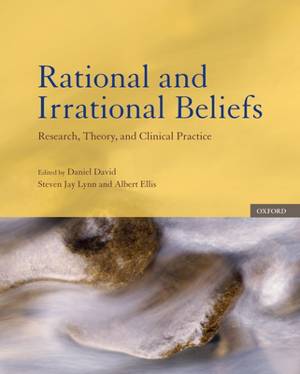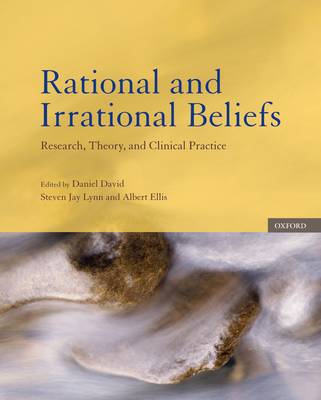
Door een staking bij bpost kan je online bestelling op dit moment iets langer onderweg zijn dan voorzien. Dringend iets nodig? Onze winkels ontvangen jou met open armen!
- Afhalen na 1 uur in een winkel met voorraad
- Gratis thuislevering in België vanaf € 30
- Ruim aanbod met 7 miljoen producten
Door een staking bij bpost kan je online bestelling op dit moment iets langer onderweg zijn dan voorzien. Dringend iets nodig? Onze winkels ontvangen jou met open armen!
- Afhalen na 1 uur in een winkel met voorraad
- Gratis thuislevering in België vanaf € 30
- Ruim aanbod met 7 miljoen producten
Zoeken
Rational and Irrational Beliefs
Research, Theory, and Clinical Practice
Daniel David, Steven Jay Lynn, Albert Ellis
Hardcover | Engels
€ 114,45
+ 228 punten
Omschrijving
In Rational and Irrational Beliefs: Research, Theory, and Clinical Practice, leading scholars, researchers, and practitioners of rational emotive behavior therapy (REBT) and other cognitive-behavioral therapies (CBTs) share their perspectives and empirical findings on the nature of rational and irrational beliefs, the role of beliefs as mediators of functional and dysfunctional emotions and behaviors, and clinical approaches to modifying irrational beliefs, enhancing rational beliefs, and adaptive coping in the face of stressful life events. Offering a comprehensive and cohesive approach to understanding REBT/CBT and its central constructs of rational and irrational beliefs, contributors review a steadily accumulating empirical literature indicating that irrational beliefs are associated with a wide range of problems in living and that exposure to rational self-statements can decrease anxiety and other psychological symptoms, and play a valuable role in health promotion and
disease prevention. Contributors also identify new frontiers of research and theory, including the link between irrational beliefs and other cognitive processes such as memory, psychophysiological responses, and evolutionary and cultural determinants of rational and irrational beliefs. A truly accessible, state-of-the-science summary of REBT/CBT research and clinical applications, Rational and Irrational Beliefs is an invaluable resource for psychotherapy practitioners of all theoretical orientations, as well as instructors, students, and academic psychologists.
disease prevention. Contributors also identify new frontiers of research and theory, including the link between irrational beliefs and other cognitive processes such as memory, psychophysiological responses, and evolutionary and cultural determinants of rational and irrational beliefs. A truly accessible, state-of-the-science summary of REBT/CBT research and clinical applications, Rational and Irrational Beliefs is an invaluable resource for psychotherapy practitioners of all theoretical orientations, as well as instructors, students, and academic psychologists.
Specificaties
Betrokkenen
- Auteur(s):
- Uitgeverij:
Inhoud
- Aantal bladzijden:
- 384
- Taal:
- Engels
Eigenschappen
- Productcode (EAN):
- 9780195182231
- Verschijningsdatum:
- 20/08/2009
- Uitvoering:
- Hardcover
- Formaat:
- Genaaid
- Afmetingen:
- 236 mm x 160 mm
- Gewicht:
- 663 g

Alleen bij Standaard Boekhandel
+ 228 punten op je klantenkaart van Standaard Boekhandel
Beoordelingen
We publiceren alleen reviews die voldoen aan de voorwaarden voor reviews. Bekijk onze voorwaarden voor reviews.











